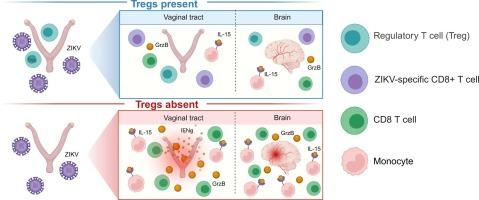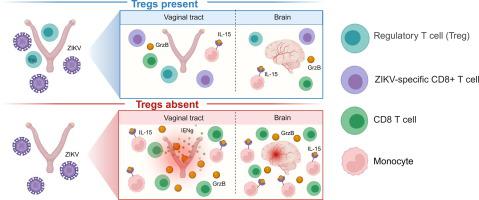Regulatory T cells restrict immunity and pathology in distal tissue sites following a localized infection
IF 7.9
2区 医学
Q1 IMMUNOLOGY
引用次数: 0
Abstract
Regulatory T cells (Tregs) are well-known to mediate peripheral tolerance at homeostasis, and there is a growing appreciation for their role in modulating infectious disease immunity. Following acute and chronic infections, Tregs can restrict pathogen-specific T cell responses to limit immunopathology. However, it is unclear if Tregs mediate control of pathology and immunity in distal tissue sites during localized infections. We investigated the role of Tregs in immunity and disease in various tissue compartments in the context of “mild” vaginal Zika virus infection. We found that Tregs are critical to generating robust virus-specific CD8 T cell responses in the initial infection site. Further, Tregs limit inflammatory cytokines and immunopathology during localized infection; a dysregulated immune response in Treg-depleted mice leads to increased T cell infiltrates and immunopathology in both the vagina and the central nervous system (CNS). Importantly, these CNS infiltrates are not present at the same magnitude during infection of Treg-sufficient mice, in which there is no CNS immunopathology. Our data suggest that Tregs are necessary to generate a robust virus-specific response at the mucosal site of infection, while Treg-mediated restriction of bystander inflammation limits immunopathology both at the site of infection as well as distal tissue sites.


调节性 T 细胞限制了局部感染后远端组织部位的免疫和病理变化。
众所周知,调节性 T 细胞(Treg)在平衡状态下介导外周耐受性,而人们也越来越认识到它们在调节传染病免疫方面的作用。急性和慢性感染后,调节性 T 细胞可限制病原体特异性 T 细胞反应,从而限制免疫病理学。然而,目前还不清楚在局部感染期间,Tregs 是否能介导对远端组织部位病理和免疫的控制。我们以 "轻度 "阴道寨卡病毒(ZIKV)感染为背景,研究了Tregs在不同组织区免疫和疾病中的作用。我们发现,Tregs 对于在初始感染部位产生强大的病毒特异性 CD8 T 细胞反应至关重要。此外,Tregs 还能限制局部感染期间的炎性细胞因子和免疫病理;Treg 缺失的小鼠免疫反应失调会导致阴道和中枢神经系统(CNS)的 T 细胞浸润和免疫病理增加。重要的是,这些中枢神经系统浸润在感染 Treg 充足的小鼠时不会以同样的程度出现,因为在这种情况下不会出现中枢神经系统免疫病理。我们的数据表明,Tregs 是在粘膜感染部位产生强大的病毒特异性反应的必要条件,而 Treg 介导的旁观者炎症限制了感染部位和远端组织部位的免疫病理。
本文章由计算机程序翻译,如有差异,请以英文原文为准。
求助全文
约1分钟内获得全文
求助全文
来源期刊

Mucosal Immunology
医学-免疫学
CiteScore
16.60
自引率
3.80%
发文量
100
审稿时长
12 days
期刊介绍:
Mucosal Immunology, the official publication of the Society of Mucosal Immunology (SMI), serves as a forum for both basic and clinical scientists to discuss immunity and inflammation involving mucosal tissues. It covers gastrointestinal, pulmonary, nasopharyngeal, oral, ocular, and genitourinary immunology through original research articles, scholarly reviews, commentaries, editorials, and letters. The journal gives equal consideration to basic, translational, and clinical studies and also serves as a primary communication channel for the SMI governing board and its members, featuring society news, meeting announcements, policy discussions, and job/training opportunities advertisements.
 求助内容:
求助内容: 应助结果提醒方式:
应助结果提醒方式:


